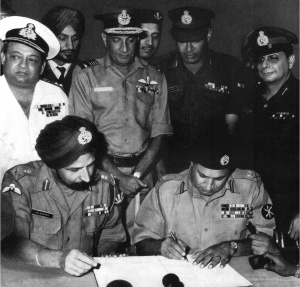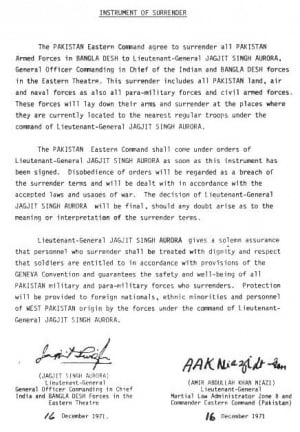Jagjit Singh Aurora: Difference between revisions
Navroopsehmi (talk | contribs) No edit summary |
No edit summary |
||
| Line 1: | Line 1: | ||
[[Image:General jagjit singh.jpg|thumb| | [[Image:General jagjit singh.jpg|thumb|right|300px]] | ||
Aurora, | Lt-Gen Jagjit Singh Aurora (February 13, 1916 - May 3, 2005) was the Indian commander whose comprehensive defeat of Pakistan in 1971 led to the creation of Bangladesh. He was born in Jhelum, British India (now, Pakistan) and died in New Delhi, India. | ||
==Early career== | |||
Jagjit Singh Aurora was born into a Sikh family, he was the son of an engineer in Jhelum, in what is now Pakistan. He was commissioned into the 2nd Punjab Regiment in 1939 after his graduation from the Indian Military Academy, and went on to command it during the 1947-1948 hosilities with Pakistan in Kashmir. He had reached the rank of brigadier by the time he was involved in border hostilities with Chinese troops in 1961 | |||
==East Pakistan== | |||
In 1971, Aurora was made commander of Indian forces in the east, and he was responsible for hostilities in East Pakistan. In less than two weeks, months of guerrilla warfare were ended and Pakistan split in two, losing 55,000 square miles of its territory and 70 million of its people, in an operation meticulously prepared months in advance by Aurora and others. Aurora had also been closely involved in training and equipping the Mukti Bahini, a ragtag group of freedom fighters who were transformed into an effective guerrilla force that harassed and demoralised the Pakistanis. | |||
This softened up the Pakistanis in readiness for India’s strike, which was launched after Pakistan carried out bombing raids on several Indian airfields on December 3, 1971. These had been preceded by several Pakistani attacks on Mukhti Bahini camps inside India. War was now inevitable. | |||
Aurora | Aurora had helped to oversee the logistical preparations for the coming battles, including the improvement of roads, communications and bridges, as well as the movement of 30,000 tons of supplies close to the border of East Pakistan. | ||
Even so, the Indian Army could never have anticipated how quickly the Pakistanis would be routed. Instead of attacking Pakistani positions head-on, Aurora ordered his troops to bypass them wherever possible and head straight for Dhaka. | |||
The key breakthrough came when thousands of forces succeeded in crossing the Meghna River, which the Pakistanis had left unguarded, having blown up the only bridge. Local people ferried the Indian troops across in huge numbers of small boats under cover of darkness: “That was the turning point,” Aurora later recalled. | |||
==Surrender of Pakistan== | |||
[[Image:Surrenderdocument.jpg|thumb|300px|right]] | |||
On December 16, 1971, a day familiar to every Bangladeshi, Aurora accepted the surrender of Pakistani forces led by General Niazi. The signing of the document ended the war, and led to the formation of Bangla Desh, the name of the new country (later reduced to a single word) was used in the Instrument of Surrender, which declared: “The Pakistan Eastern Command agree to surrender all Pakistan armed forces in Bangla Desh to Lieutenant-General Jagjit Singh Aurora, General Officer Commanding-in-Chief of the Indian and Bangla Desh forces in the Eastern Theatre.” Aurora accepted the surrender without a word, while thousands cheered. He was hoisted on soldiers’ shoulders amid shouts of jai Bangla (victory to Bangla). | |||
Niazi then had to be swiftly spirited away when crowds began calling for him to be lynched. Back home, he was widely criticised for submitting to such humiliation. More than 90,000 Pakistani fighters were taken prisoner after the ceremony. The total number of uniformed personnel consist of about 79,676 of which 55692 are Army, 16354 are of paramilitary and 5296 are civilian police personnel. In addition, about 800 PAF and 1000 Pakistani Navy personnel 1. In honour of his contribution to Bangladesh liberation, Lieutenant-General Jagjit Singh Aurora was awarded the 'Bir Pratik' gallantry award by the newly formed Bangladesh nation. | |||
==Later life== | |||
After his retirement Aurora spent several years as an MP in the Rajya Sabha (Upper House of Parliament) for the Sikh party, the Akali Dal. | |||
[[Category: | |||
He fiercely opposed the 1984 army attack on the Golden Temple in Amritsar, the Sikhs’ holiest shrine, to flush out armed Sikh militants who had taken up positions inside. He was also a leading activist on behalf of the victims of anti-Sikh riots in Delhi in 1984, which followed the assassination of the Prime Minister, Indira Gandhi, by her Sikh bodyguards. | |||
He died on May 3, 2005, aged 89. He is survived by a son and daughter. After his death, the eternal gratitude of Bangladesh to General Aurora was emphasised in a message to India, from Morshed Khan, the Bangladeshi Foreign Minister, stating: “Aurora will be remembered in the history of Bangladesh for his contribution during our war of liberation in 1971, when he led the allied forces.” The site of the Pakistani surrender is being converted into what will be called Independence Square, with an eternal flame. | |||
[[Category: Great Sikh Warriors]] | |||
Revision as of 08:35, 6 June 2007
Lt-Gen Jagjit Singh Aurora (February 13, 1916 - May 3, 2005) was the Indian commander whose comprehensive defeat of Pakistan in 1971 led to the creation of Bangladesh. He was born in Jhelum, British India (now, Pakistan) and died in New Delhi, India.
Early career
Jagjit Singh Aurora was born into a Sikh family, he was the son of an engineer in Jhelum, in what is now Pakistan. He was commissioned into the 2nd Punjab Regiment in 1939 after his graduation from the Indian Military Academy, and went on to command it during the 1947-1948 hosilities with Pakistan in Kashmir. He had reached the rank of brigadier by the time he was involved in border hostilities with Chinese troops in 1961
East Pakistan
In 1971, Aurora was made commander of Indian forces in the east, and he was responsible for hostilities in East Pakistan. In less than two weeks, months of guerrilla warfare were ended and Pakistan split in two, losing 55,000 square miles of its territory and 70 million of its people, in an operation meticulously prepared months in advance by Aurora and others. Aurora had also been closely involved in training and equipping the Mukti Bahini, a ragtag group of freedom fighters who were transformed into an effective guerrilla force that harassed and demoralised the Pakistanis.
This softened up the Pakistanis in readiness for India’s strike, which was launched after Pakistan carried out bombing raids on several Indian airfields on December 3, 1971. These had been preceded by several Pakistani attacks on Mukhti Bahini camps inside India. War was now inevitable.
Aurora had helped to oversee the logistical preparations for the coming battles, including the improvement of roads, communications and bridges, as well as the movement of 30,000 tons of supplies close to the border of East Pakistan.
Even so, the Indian Army could never have anticipated how quickly the Pakistanis would be routed. Instead of attacking Pakistani positions head-on, Aurora ordered his troops to bypass them wherever possible and head straight for Dhaka.
The key breakthrough came when thousands of forces succeeded in crossing the Meghna River, which the Pakistanis had left unguarded, having blown up the only bridge. Local people ferried the Indian troops across in huge numbers of small boats under cover of darkness: “That was the turning point,” Aurora later recalled.
Surrender of Pakistan
On December 16, 1971, a day familiar to every Bangladeshi, Aurora accepted the surrender of Pakistani forces led by General Niazi. The signing of the document ended the war, and led to the formation of Bangla Desh, the name of the new country (later reduced to a single word) was used in the Instrument of Surrender, which declared: “The Pakistan Eastern Command agree to surrender all Pakistan armed forces in Bangla Desh to Lieutenant-General Jagjit Singh Aurora, General Officer Commanding-in-Chief of the Indian and Bangla Desh forces in the Eastern Theatre.” Aurora accepted the surrender without a word, while thousands cheered. He was hoisted on soldiers’ shoulders amid shouts of jai Bangla (victory to Bangla).
Niazi then had to be swiftly spirited away when crowds began calling for him to be lynched. Back home, he was widely criticised for submitting to such humiliation. More than 90,000 Pakistani fighters were taken prisoner after the ceremony. The total number of uniformed personnel consist of about 79,676 of which 55692 are Army, 16354 are of paramilitary and 5296 are civilian police personnel. In addition, about 800 PAF and 1000 Pakistani Navy personnel 1. In honour of his contribution to Bangladesh liberation, Lieutenant-General Jagjit Singh Aurora was awarded the 'Bir Pratik' gallantry award by the newly formed Bangladesh nation.
Later life
After his retirement Aurora spent several years as an MP in the Rajya Sabha (Upper House of Parliament) for the Sikh party, the Akali Dal.
He fiercely opposed the 1984 army attack on the Golden Temple in Amritsar, the Sikhs’ holiest shrine, to flush out armed Sikh militants who had taken up positions inside. He was also a leading activist on behalf of the victims of anti-Sikh riots in Delhi in 1984, which followed the assassination of the Prime Minister, Indira Gandhi, by her Sikh bodyguards.
He died on May 3, 2005, aged 89. He is survived by a son and daughter. After his death, the eternal gratitude of Bangladesh to General Aurora was emphasised in a message to India, from Morshed Khan, the Bangladeshi Foreign Minister, stating: “Aurora will be remembered in the history of Bangladesh for his contribution during our war of liberation in 1971, when he led the allied forces.” The site of the Pakistani surrender is being converted into what will be called Independence Square, with an eternal flame.


